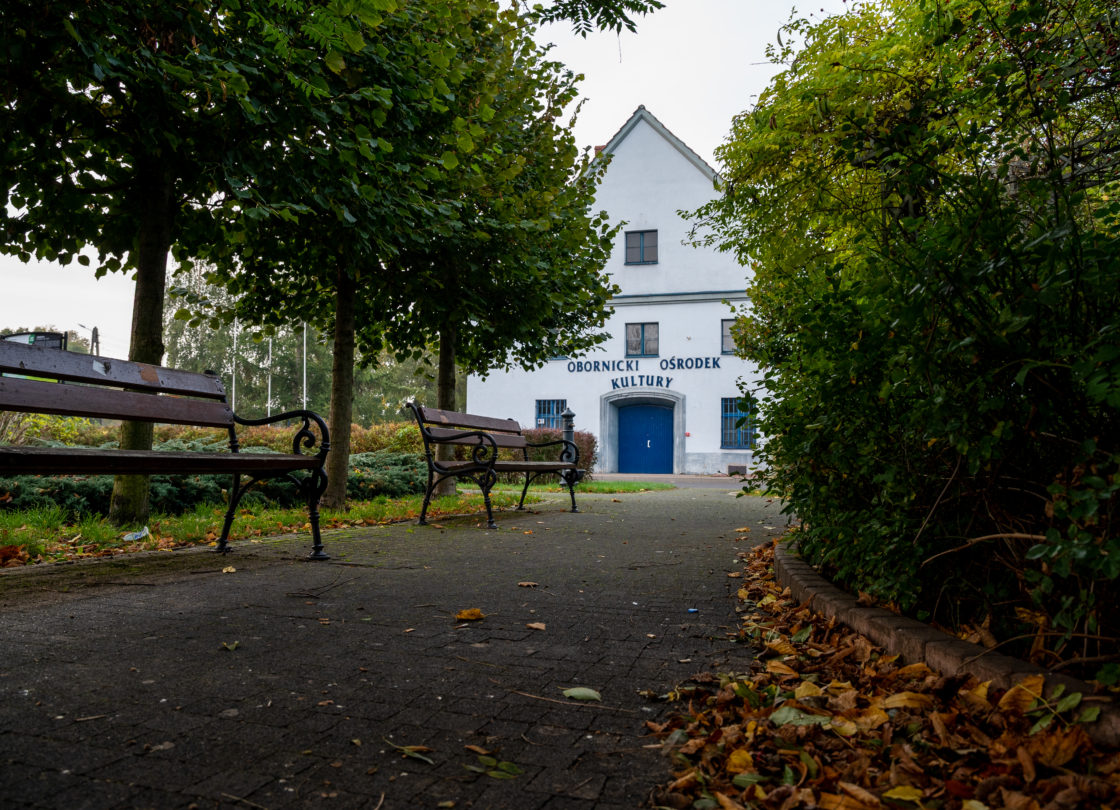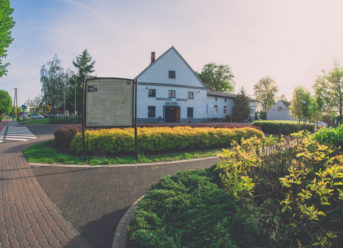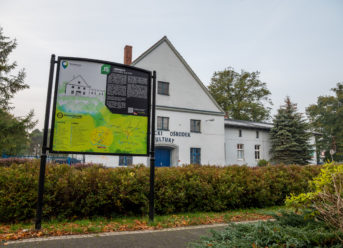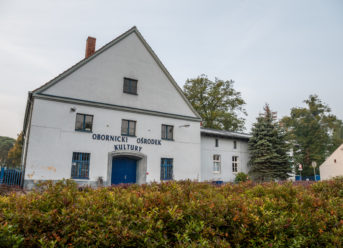Obornicki Ośrodek Kultury
Das Kulturzentrum in Oborniki
Oborniki Cultural Centre
Organizator wielu wydarzeń kulturalnych. Do kalendarium tej instytucji na stałe wpisały się przedsięwzięcia artystyczne i społeczne, edukacja, wystawy, spotkania, konkursy i koncerty. Pod patronatem ośrodka działają koła zainteresowań i sekcje, zespoły folklorystyczne i taneczne. W ofercie instytucji znaleźć można szeroki wachlarz warsztatów muzycznych, plastycznych, a nawet kulinarnych.
Życie kulturalne w Obornikach silnie rozwijało się już w okresie dwudziestolecia międzywojennego. W pierwszych dniach po odzyskaniu niepodległości w 1918 roku działalność rozpoczęło Towarzystwo Czytelni Ludowych. Zajmowało się ono propagowaniem czytelnictwa, organizowało spotkania autorskie, wykłady i wieczornice. Przedstawienia amatorskie i imprezy kulturalno – oświatowe odbywały się w sali hotelu Klosego, przy ulicy Powstańców Wielkopolskich.
W okresie w Obornikach działały także chóry i stowarzyszenia śpiewacze i muzyczne: Dźwięk, Święta Cecylia, Lutnia, Moniuszko, oraz koło Mandolinistów Polonia.
Tuż po zakończeniu II wojny światowej życie kulturalne w Obornikach rozwijało się na nowo. Na przełomie marca i kwietnia 1945 roku powstała Powiatowa Centrala Biblioteczna, która zajmowała się odnajdywaniem i przechowywaniem książek z Czytelni Ludowych. 15 kwietnia 1946 roku uruchomiono kino Muza, które znajdowało się w byłym hotelu Klosego. Kinem zarządzała Gminna Spółdzielnia Samopomoc Chłopska, a dysponowało ono 250 miejscami siedzącymi. W latach 1964 – 1965 kino otrzymało nowoczesny ekran panoramiczny, oraz potrzebny sprzęt do wyświetlania filmów szerokoekranowych.
W latach 1968 – 1969 w powołanym do życia Referacie Kultury pojawiły się plany budowy Powiatowego Domu Kultury, oraz Miejskiej Biblioteki Publicznej. Ostatecznie z różnych powodów nowy dom kultury nie został zbudowany, a na potrzeby życia kulturalnego wykorzystano istniejącą już salę, znajdującą się przy Strzelnicy Bractwa Kurkowego. W latach 50. odbywały się tu, m.in. różnego rodzaju teatrzyki dla dzieci i funkcjonowały kółka zainteresowań. Życiem kulturalne kreował w tym okresie Powiatowy Dom Kultury, który w 1975 roku przemianowany został na Obornicki Ośrodek Kultury. Pod nazwą taką ośrodek funkcjonuje do dziś.
Das Kulturzentrum in Oborniki wurde zum Mittelpunkt des kulturellen Lebens der Stadt. Zahlreiche künstlerische und gesellschaftliche Veranstaltungen stehen fest im Kalender des Kulturzentrums: Ausstellungen, Aufführungen, Bildungsveranstaltungen, Treffen, Wettbewerbe und Konzerte. Außerdem entwickeln sich unter dem Patronat vom Kulturzentrum viele Interessengemeinschaften, Folk- und Tanzgruppen. Das Kulturhaus bietet ein breites Spektrum an Musik- und Kunstwerkstätte an. Auch die hier organisierten Kochwerkstätte erfreuen sich an eine große Popularität.
In der Vergangenheit legte man auch auf das kulturelle Leben der Bürger einen großen Wert. Die Zwischenkriegszeit war die Blütezeit der Kultur in Oborniki. Kurz nach der Wiedererlangung der staatlichen Unabhängigkeit Polens (1918) wurde in Oborniki die Volks-Lesegesellschaft, deren Hauptaufgabe die Leseförderung war, gegründet. Es wurden von der Gesellschaft Lesungen, Vorträge und Vortragsabende veranstaltet. Eine bedeutende Rolle spielte zu dieser Zeit das an der Powstańcy Wielkopolscy-Straße gelegene "Hotel pod Orłem", das für seine kulturelle Tätigkeit bekannt war. Im Hotelsaal fanden sowohl Amateurspiele als auch verschiedenartige Bildungs- und Kulturveranstaltungen statt. Zur gleichen Zeit wurden in der Stadt Chöre, Musikgesellschaften und Musikgruppen wie z.B. "Dźwięk", "Święta Cecylia", "Lutnia", "Moniuszko", Koło Mandolinistów Polonia" gegründet.
Nach dem Zweiten Weltkrieg entwickelte sich das städtische Kulturleben nach wie vor. Schon im März/April 1945 wurde eine Kreisbibliothek (Powiatowa Centrala Biblioteczna) errichtet. Zu Beginn ihrer Tätigkeit hatte sie zum Ziel, den Bücherbestand der Lesegesellschaften zu ersuchen und zu bewahren.
Am 15. April 1946 wurde im ehemaligen Hotel der Familie Klose das Kino "Muza" eröffnet. Das mit über 250 Sitzplätzen ausgestattete Kino wurde von einer staatlichen Gemeinde-Genossenschaft "Samopomoc Chłopska" (Gminna Spółdzielnia Samopomoc Chłopska) geleitet. In den Jahren 1964-1965 wurde im Kinosaal eine Panorama-Leinwand errichtet, man kaufte auch moderne Kinoprojektoren, dank deren Vorführungen von Filmen im Breitfilmformat durchgeführt werden konnten.
Im Kulturreferat, das von der kommunistischen Stadtverwaltung gegründet wurde, entstand in den Jahren 1968-1969 ein Plan, in Oborniki das neue Gebäude für die Öffentliche Bibliothek und ein Kulturhaus aufzubauen. Endgültig war das Kulturhaus aus verschiedenen Gründen nicht entstanden. Stattdessen wurde ein Gebäude der Schützenverein-Schließanlage für die wachsende Bedürfnisse der städtischen Kultur adaptiert. Schon früher wurde der Ort für kulturelle Ziele genutzt. Bereits in den 50-er Jahren fanden in einem dem Schützenverein angehörenden Saal Kindertheater-Aufführungen statt. Die Räumlichkeiten wurden auch von den kurz nach dem Krieg gegründeten Arbeitsgemeinschaften genutzt.
Jahrzehntelang bildete das Kulturzentrum in Oborniki das kulturelle und gesellschaftliche Leben der Stadt. Im Jahre 1975 wurde das ehemalige „Kreiskulturhaus“ (Powiatowy Dom Kultury) in „Das Kulturzentrum der Stadt Oborniki“ (Obornicki Ośrodek Kultury) umgewandelt. Unter diesem Namen ist es auch heute lokal und überregional bekannt.
Organizer of many cultural events. Artistic and social undertakings, education, exhibitions, meetings, competitions and concerts have been permanently included in the calendar of this institution. Under the patronage of the centre there are interest circles and sections, folklore and dance groups. The institution's offer includes a wide range of music, art and even culinary workshops.
The cultural life in Oborniki developed strongly during the interwar period. In the first days after Poland regained independence in 1918, the People's Reading Room Association started its activity. It promoted reading, organized meetings with authors, lectures and evenings. Amateur shows and cultural and educational events took place in the hall of the Klose Hotel, at Powstańców Wielkopolskich Street [no. 23]
Shortly after the end of World War II, the cultural life in Oborniki developed anew. At the turn of March and April 1945 the District Library Headquarters was established, which dealt with finding and storing books from People's Reading Rooms. On April 15, 1946 the Muza cinema was opened, which was located in the former Klose Hotel. The cinema was managed by the Municipal Peasant Self-help Cooperative, and it had 250 seats. Between 1964 and 1965 the cinema received a modern panoramic screen and the necessary equipment to screen widescreen films.
Between 1968 and 1969, plans to build the District House of Culture and the Municipal Public Library appeared in the newly established Cultural Department. Eventually, for various reasons, the new community centre was not built, and for the needs of cultural life the existing hall, located at the Shooting Range of the Kurkowe Brotherhood, was used. In the 1950s, various theatres for children took place he and there were interest circles. At that time, the cultural life was created by the District House of Culture, which in 1975 was renamed the Obornicki Cultural Centre. The centre has been operating under this name until today.






